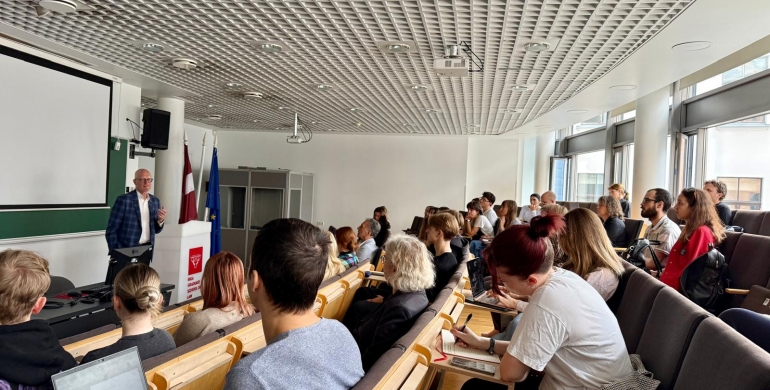On Friday afternoon of 19 September, Riga Graduate School of Law welcomed Professor Ryszard Piotrowicz from Aberystwyth University in Wales, UK, for a public lecture entitled “Lessons from the War Zones: The Failure, or Limitations, of International Humanitarian Law?”.
In his address, Professor Piotrowicz provided a critical exploration of international humanitarian law (IHL), assessing its capacity to protect victims of conflict while highlighting the recurring human shortcomings that weaken its application.
Professor Piotrowicz invited the audience to consider how law operates in daily life, drawing parallels between seemingly minor infractions, such as driving just one kilometer per hour above the speed limit, an act still unlawful, or disregarding the “water only” notice at the entrance to the RGSL auditorium by entering with a cup of coffee and the far graver breaches that occur in times of armed conflict. He underscored that although international law explicitly forbids actions such as the killing of civilians, sexual violence, and crimes against children, such violations persist in contemporary conflicts, including those in Gaza, Ukraine, and others, as reflected by RGSL 3Y Law&Diplomacy student Eva Šlēziņa.
The choices made to disobey the law are the choices humans make: “IHL has not failed, international law has not failed, law has not failed,” he argued. “We should not blame the law for human failures; we should blame humans for their failure to obey the law.”
Drawing on historical and contemporary examples, including atrocities in Bosnia and Sierra Leone, as well as providing an example of the German occupation of the Channel Islands in World War II, Professor Piotrowicz illustrated how periods of crisis can prompt ordinary individuals to engage in acts they might not otherwise commit. He noted that while international humanitarian law offers sufficient protection for victims in principle, its effectiveness is contingent upon respect, awareness, and enforcement. The example showed that within the same community, responses varied: some collaborated with the occupiers, others resisted, and many remained passive observers in the hope of avoiding repercussions. As Professor Piotrowicz emphasised, such behaviour is not determined by nationality, but by individual choice.
The lecture concluded with a sobering reflection: conflicts create an environment where accountability diminishes, allowing individuals who would not commit crimes in peacetime to exploit chaos and take advantage of impunity. “For me, it is fascinating that people who were not criminals in peacetime become criminals in wartime. Why do they do that? Perhaps because they believe they will not be punished.”
The event underscored the urgent need for stronger respect for International Humanitarian Law and accountability mechanisms, while reminding us that the law’s power lies not in its failure, but in humanity’s choice to uphold or disregard it.
Before the lecture, Prof. Piotrowicz and Chairwoman of the Women’s NGOs Cooperation Network Inete Ielīte met with RGSL Acting Rector Dr. Inga Kačevska to discuss the opportunities for cooperation.
Ryszard Piotrowicz has been Professor of Law at Aberystwyth University in Wales since 1999. He previously taught international law at the Universities of Glasgow, Durham, and Tasmania, where he served as Dean of the Law Faculty.
He specialises in Migration Law, Human Trafficking and International Humanitarian Law, and has published extensively in these areas. He has consulted extensively for international organisations, working with the ICRC, UNHCR, EU, OSCE, IOM, ICMPD, and the Council of Europe. From 2008 to 2015, he served two terms as a member of the European Commission’s Group of Experts on Trafficking in Human Beings. From 2013 to 2012, he was a member of the Council of Europe’s Group of Experts on Action against Trafficking in Human Beings (Vice-President, 2017-2020). In 2023-24, he served as a Specialist Advisor to the UK House of Commons Select Committee for Home Affairs' enquiry into human trafficking in the UK.
The lecture is organised in cooperation with NGO Sieviešu sadarbības tīkls and Anna Lindh Foundation.
Sieviešu sadarbības tīkls, or Women’s NGOs Cooperation Network, was established in 2003 to coordinate women’s NGOs in Latvia, advocate policy proposals, and promote human rights and civic society development.
The Anna Lindh Foundation (ALF) was established in 2005 as an intergovernmental organisation that brings together civil society entities, institutions, governments, and change-makers from across the Euro-Mediterranean region.

